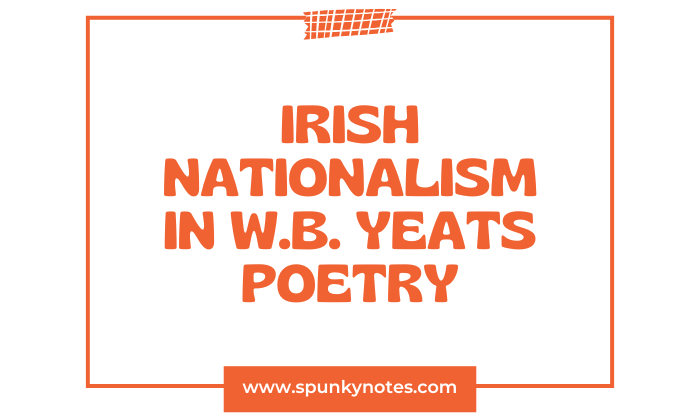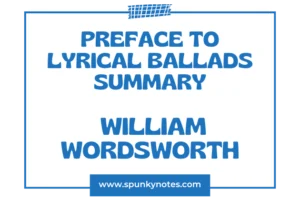
Q. W.B. Yeats translates Irish history, patriotism, and struggle for freedom into his poetry. Elucidate.
W.B. Yeats and the Irish Struggle for Freedom
W.B. Yeats was an important poet, playwright, and thinker in Ireland. He played a key role in Ireland’s cultural and political life. His poetry shows his love for Irish history and his support for Ireland’s fight for independence from British rule.
Yeats often referred to Ireland’s past in his poems, mixing myths and history with themes of patriotism and freedom. He recorded these struggles through poetry and helped shape the country’s national identity.
Yeats Early Engagement with Irish Nationalism
Yeats’s early poetry was driven by a strong desire to reclaim and preserve Irish culture and heritage. Born in 1865, Yeats grew up when Ireland was under British control, and the Irish fought for independence.
In his youth, Yeats was inspired by the Irish nationalist movement. This movement aimed to restore Irish independence not just through politics but also by reviving Ireland’s culture and traditions.
At the start of his career, Yeats’s poetry often reflected these nationalist ideals. He celebrated Ireland’s rich folklore, literature, and unique identity.
In his poem The Lake Isle of Innisfree (1890), Yeats imagines escaping to an idyllic, peaceful retreat in Ireland, free from the oppression of British rule.
The poem expresses Yeats’s longing to return to a more authentic, untainted Ireland, away from the turmoil of political struggle.
I will arise and go now, and go to Innisfree,
And a small cabin build there, of clay and wattles made;
Nine bean-rows will I have there, a hive for the honey-bee,
And live alone in the bee-loud glade
These lines show a vision of Ireland as a place of beauty, tranquillity, and spiritual connection, unspoiled by foreign influence. The personal yearning in this poem reflects Yeats’ desire for a revived Ireland—one grounded in its history and heritage.
The Political Context
As Yeats matured, Ireland’s political landscape changed dramatically. The Irish Republican Brotherhood, the Sinn Féin movement, and other nationalist groups pushed for independence from British rule, leading to the 1916 Easter Rising.
Although the rebellion was initially unsuccessful and resulted in heavy casualties, it became a turning point in Ireland’s fight for freedom.
In the aftermath, the Irish people’s desire for independence grew stronger. Yeats responded to this shift in both his poetry and his personal views on nationalism.
One of Yeats’s most famous poems, Easter 1916 (1921), was written in response to the rebellion. The poem reflects Yeats’s mixed feelings about the uprising.
He admires the rebels’ courage and their vision of Irish freedom. However, he also knows the violence and bloodshed accompanying the struggle. Yeats famously writes:
All changed, changed utterly:
A terrible beauty is born.
The phrase “terrible beauty” symbolizes the revolution’s dual nature: its nobility and destructive consequences. For Yeats, the rebellion marked the birth of a new Ireland but also symbolized the costs of achieving independence.
The poem goes on to depict the sacrifice of the Irish rebels and the way their actions transformed the national consciousness.
Yeats’ deep emotional connection to Ireland’s struggle for freedom is evident in his portrayal of the revolutionaries. He writes:
Too long a sacrifice
Can make a stone of the heart.
Yeats expresses the emotional toll that prolonged struggle and sacrifice take on individuals. The line suggests that the fight for freedom, though noble, comes at a significant cost—one that may strip away the humanity of those involved.
Yeats Role as a Cultural Nationalist
While Yeats was a political figure and supporter of Irish independence, he was also deeply involved in the cultural nationalist movement.
He believed that true freedom could not be achieved through political means alone. It required a cultural revival—a return to Ireland’s rich artistic, literary, and spiritual heritage.
Yeats played a key role in founding the Abbey Theatre, symbolizing Ireland’s nationalist cultural awakening. His theatre work and his promotion of Irish folklore and mythology strengthened his role as a cultural nationalist.
Yeats’s support for the Irish Renaissance is evident in his poem “The Irish Airman Foresees His Death” (1919), which expresses the idealism and sacrifice of those fighting for Irish freedom.
I know that I shall meet my fate
Somewhere among the clouds above;
Those that I fight I do not hate,
Those that I guard I do not love;
The speaker, an Irish aviator, believes his death will contribute to the greater cause of Irish independence. The poem reflects the themes of heroism and sacrifice central to Yeats’s view of the Irish struggle.
For Yeats, the fight for independence was not just a political goal but also a spiritual and cultural mission.
Yeats Influence on Irish History and National Identity
Yeats remained closely tied to his time’s political and cultural events throughout his life. His poetry reflects the struggles and triumphs of Ireland’s quest for freedom.
By documenting the events of the 1916 Easter Rising and other key moments in Irish history, Yeats helped shape the national consciousness.
His works became symbols of Irish patriotism, urging future generations to honour the sacrifices made for independence.
In The Rose Tree (1893), Yeats presents Ireland as a symbol of beauty and purity and a land fraught with political and social turmoil.
But where can we draw water,’
Said Pearse to Connolly,
‘When all the wells are parched away?
O plain as plain can be
There’s nothing but our own red blood
Can make a right Rose Tree.
This imagery of Ireland as both a land of dreams and a place of struggle is a consistent theme in Yeats’s works. He views the nation as a place where ideals and reality often clash, but the fight for freedom is ultimately worth the sacrifice.
Yeats also played a key role in shaping a new, post-colonial Irish identity. His works not only reflect the historical struggles of the Irish people but also help redefine what it means to be Irish in a post-colonial world.
Through his poetry, Yeats gave voice to the hopes and dreams of a nation seeking to break free from centuries of British rule. He captured the spirit of a country determined to regain its independence and assert its cultural and national identity.

